Jeremiah 34 meaning explained in AI Summary
Jeremiah 34 recounts a time when Jerusalem was under siege by the Babylonian army led by Nebuchadnezzar. The chapter highlights the Israelites' fleeting obedience to God and the dire consequences of their broken promises.
1. False Hope and a Broken Covenant (Verses 1-7):
- God speaks through Jeremiah, prophesying the imminent fall of Jerusalem and the capture of King Zedekiah by Nebuchadnezzar.
- He emphasizes that Zedekiah will be treated with some dignity even in captivity.
2. A Glimmer of Obedience, Quickly Extinguished (Verses 8-11):
- King Zedekiah, fearing the Babylonian siege, makes a covenant with the people of Jerusalem to free their Hebrew slaves, as commanded by God's law.
- This act of obedience is short-lived. Once the Babylonian siege is temporarily lifted, the people of Jerusalem break their promise and re-enslave those they had just freed.
3. God's Anger and Judgment (Verses 12-22):
- God, angered by their deceit and broken covenant, declares that He will bring disaster upon them.
- He reiterates the prophecy of Jerusalem's fall and the people's suffering.
- He specifically condemns their betrayal of the freed slaves, emphasizing the sanctity of covenants made in His name.
Key Themes:
- The Consequences of Disobedience: The chapter emphasizes that God doesn't take broken promises lightly. The Israelites' fleeting obedience and subsequent betrayal have dire consequences.
- Social Justice and God's Covenant: The freeing of slaves highlights God's concern for the oppressed and the importance of social justice within the covenant. Their re-enslavement demonstrates a blatant disregard for God's law and compassion.
- The Certainty of God's Word: Despite the temporary reprieve from the Babylonian siege, God's prophecy of Jerusalem's fall remains. This underscores the unwavering truth and power of God's word.
Overall, Jeremiah 34 serves as a stark reminder of the importance of genuine obedience to God and the dangers of placing faith in fleeting promises. It highlights the tragic consequences of breaking covenants made in God's name and emphasizes His unwavering commitment to justice and truth.
Jeremiah 34 bible study ai commentary
Jeremiah 34 condemns the profound hypocrisy of Judah's leadership and people under King Zedekiah. It is a tale of two covenants: one a divine oracle promising a specific, personal fate for the king, and the other a national pact with God concerning slavery, which is made under duress and broken in greed. The chapter masterfully illustrates that insincere, situational obedience is viewed by God as a profane mockery, and that social injustice is a direct violation of one's relationship with Him, leading to inescapable judgment where the punishment poetically fits the crime.
Jeremiah 34 Context
The chapter is set during the final Babylonian siege of Jerusalem (c. 588–587 BC) under Nebuchadnezzar II. King Zedekiah, Judah's last king, is on the throne. The prophecy in the first part is delivered while the Judean towns of Lachish and Azekah are still resisting the Babylonian invasion, highlighting the imminent threat. The second part likely occurs when the Babylonian army temporarily lifts the siege to confront an approaching Egyptian force (Jer 37:5), a moment of false hope that reveals the true, unrepentant heart of the people of Jerusalem.
Jeremiah 34:1-7
The word that came to Jeremiah from the LORD, when Nebuchadnezzar king of Babylon and all his army and all the kingdoms of the earth under his dominion and all the peoples were fighting against Jerusalem and all of its towns: "Thus says the LORD, the God of Israel: Go and speak to Zedekiah king of Judah and say to him, 'Thus says the LORD: Behold, I am giving this city into the hand of the king of Babylon, and he shall burn it with fire. You shall not escape from his hand but shall surely be captured and delivered into his hand. Your eyes shall see the eyes of the king of Babylon, and he shall speak with you face to face, and you shall go to Babylon.' Yet hear the word of the LORD, O Zedekiah king of Judah! Thus says the LORD concerning you: 'You shall not die by the sword. You shall die in peace. And as spices were burned for your fathers, the former kings who were before you, so people shall burn spices for you and lament for you, saying, "Alas, lord!"' For I have spoken the word, declares the LORD.” Then Jeremiah the prophet spoke all these words to Zedekiah king of Judah, in Jerusalem, when the army of the king of Babylon was fighting against Jerusalem and against all the cities of Judah that were left, Lachish and Azekah, for these were the only fortified cities of Judah that remained.
In-depth-analysis
- Verse 1: Establishes God's sovereignty. The immense, multinational force under Nebuchadnezzar is not the ultimate agent; God is the one sending the message. The siege is His ordained judgment.
- Verse 2: The verdict is absolute and unconditional: the city will be captured and burned. This removes any illusion that Zedekiah’s actions or repentance can alter the city's fate.
- Verse 3: The prophecy for Zedekiah is intensely personal and inescapable. He will see Nebuchadnezzar face to face. This contradicts the false prophets' messages of deliverance. The prophecy removes all hope of escape.
- Verses 4-5: A specific, limited mercy is granted to Zedekiah personally. He will not be executed by the sword but will "die in peace" (be'shalom). This peace refers to the manner of his death, not the circumstances of his life. He is promised a royal burial with lamentation, a stark contrast to the cursed, unburied end of King Jehoiakim (Jer 22:18-19). This is grace within judgment.
- Verse 7: The mention of Lachish and Azekah grounds the prophecy in a precise historical moment. These were the last major fortified cities in Judah to hold out against the Babylonians besides Jerusalem. Archaeological finds (The Lachish Letters) corroborate the dire situation of this period, lending external support to the biblical account.
Bible references
- 2 Kgs 25:4-7: Then the city was broken into... and the king went... But the army of the Chaldeans... overtook him... they put out the eyes of Zedekiah and bound him... and took him to Babylon. (The direct fulfillment of his capture).
- Ezek 12:13: ...I will bring him to Babylon, to the land of the Chaldeans, yet he shall not see it, and he shall die there. (A parallel prophecy fulfilled when Zedekiah was blinded before being taken to Babylon, thus going to the land but not seeing it).
- Jer 39:6-7: Then the king of Babylon slaughtered the sons of Zedekiah... before his eyes... He also put out the eyes of Zedekiah and bound him... (Another account of the horrific fulfillment).
Cross references
Jer 21:7 (previous prediction of capture), Jer 52:8-11 (detailed fulfillment), 2 Chr 36:17-21 (summary of the fall).
Jeremiah 34:8-11
The word that came to Jeremiah from the LORD after King Zedekiah had made a covenant with all the people in Jerusalem to make a proclamation of liberty to them, that everyone should set free his Hebrew slaves, male and female, so that no one should hold another Judean a slave. And all the officials and all the people who had entered into the covenant obeyed and set them free; each one his male and his female slave, and did not hold them in slavery any longer. But afterward they turned around and took back the male and female slaves they had set free, and brought them into subjection as slaves.
In-depth-analysis
- Verse 8-9: Faced with the siege, Zedekiah and the people make a covenant to "proclaim liberty" (li'qro lahem deror). This phrase is taken directly from the law for the Year of Jubilee (Lev 25:10). They are finally observing the laws of releasing Hebrew slaves (Deut 15:12) after years of neglect. The motive appears to be a desperate, last-ditch effort to appease God and earn divine favor to lift the siege.
- Verse 10: There is a moment of apparent national revival and obedience. The slave owners comply with the covenant and release their slaves.
- Verse 11: The hypocrisy is exposed. "But afterward they turned around..." The stimulus for this reversal was likely the temporary retreat of the Babylonian army to face the Egyptians (Jer 37:5). As soon as the immediate pressure was gone, their greed overwhelmed their fear of God. They reneged on their solemn oath, re-enslaving the people they had just freed. This act reveals their repentance was shallow and self-serving, not genuine.
Bible references
- Deut 15:12: If your brother, a Hebrew man or a Hebrew woman, is sold to you, he shall serve you six years, and in the seventh year you shall let him go free from you. (The specific law they were finally, and then flagrantly, breaking).
- Exod 21:2: When you buy a Hebrew slave, he shall serve six years, and in the seventh he shall go out free, for nothing. (The foundational statute from the Mosaic Law).
- Neh 5:1-5, 11: Now there arose a great cry of the people... against their Jewish brothers... Let us now restore to them, this very day, their fields, their vineyards... (A later, similar situation of social injustice that Nehemiah confronts and resolves with true repentance).
- Lev 25:10: And you shall consecrate the fiftieth year, and proclaim liberty throughout the land to all its inhabitants. (The sacred "Jubilee" principle they invoked in their false covenant).
Cross references
2 Kgs 23:3 (Josiah's covenant), Isa 58:6 (true fasting is freeing the oppressed), Jas 2:13 (mercy triumphs over judgment).
Jeremiah 34:12-17
The word of the LORD came to Jeremiah from the LORD: "Thus says the LORD, the God of Israel: I myself made a covenant with your fathers when I brought them out of the land of Egypt, out of the house of slavery... At the end of seven years each of you must set free his Hebrew brother... But your fathers did not listen to me... You recently repented and did what was right in my eyes... but then you turned and profaned my name... Therefore, thus says the LORD: You have not obeyed me by proclaiming liberty... behold, I proclaim a liberty for you, declares the LORD, to the sword, to pestilence, and to famine. I will make you a horror to all the kingdoms of the earth.
In-depth-analysis
- Verse 13-14: God frames their sin against the backdrop of the Exodus. He reminds them that He delivered them from the "house of slavery," and that freedom for their brothers was a core tenet of that foundational covenant. Their act of enslaving fellow Hebrews is a betrayal of their own redemption story.
- Verse 15-16: God acknowledges their brief obedience ("you recently repented") only to highlight the gravity of their reversal. Their turning back is not just breaking a promise but "profaning my name" (mechallelîm et shemî), because the covenant was made publicly in His temple, invoking His authority. It was a direct insult to His holiness.
- Verse 17: The judgment is a form of divine, poetic irony—a classic lex talionis. Since they would not "proclaim liberty" to their slaves, God now "proclaims a liberty" for them. But this is a liberty to be destroyed by the classic trio of covenant curses: sword, pestilence, and famine. They denied freedom to others, so God releases them from His protection. He will make them a "horror" (le'za'avah), a warning of revulsion, to all nations.
Bible references
- Deut 28:25: The LORD will cause you to be defeated before your enemies... and you shall be a horror to all the kingdoms of the earth. (The curse from the Deuteronomic covenant, which God now enacts).
- Gal 6:7: Do not be deceived: God is not mocked, for whatever one sows, that will he also reap. (The principle of reaping what you sow, perfectly illustrated here).
- Matt 7:2: ...and with the measure you use, it will be measured to you. (Jesus' teaching on the principle of divine reciprocity in judgment).
Cross references
Deut 4:23-24 (warning against forgetting the covenant), Amos 8:4-7 (condemning oppression of the poor), Rom 2:24 (God's name blasphemed among Gentiles because of you).
Jeremiah 34:18-22
And the men who transgressed my covenant and did not keep the terms of the covenant that they made before me, I will make them like the calf that they cut in two and passed between its parts—the officials of Judah, the officials of Jerusalem, the eunuchs, the priests, and all the people of the land who passed between the parts of the calf. And I will give them into the hand of their enemies and into the hand of those who seek their life. Their dead bodies shall be food for the birds of the air and the beasts of the earth. And Zedekiah king of Judah and his officials I will give into the hand of their enemies... the army of the king of Babylon which has withdrawn from you. Behold, I will command, declares the LORD, and will bring them back to this city. And they shall fight against it and take it and burn it with fire. I will make the cities of Judah a desolation, without inhabitant."
In-depth-analysis
- Verse 18: This verse describes the ancient rite of "cutting a covenant" (karat berit). An animal was cut in two, and the parties making the oath would walk between the halves. This was a self-maledictory oath, implicitly stating, "May I become like this animal if I break this covenant." God now turns their own ritual against them.
- Verse 19: God lists all segments of society that participated, from the top officials to the common people. No one who partook in this hypocritical oath is exempt from the curse they symbolically invoked upon themselves.
- Verse 20: The fulfillment of the self-maledictory oath is stated explicitly: their dead bodies will be left unburied, to be eaten by scavenger birds and beasts—a terrible curse in the ancient world and the ultimate disgrace.
- Verse 21-22: God declares His total sovereignty over geopolitical events. The Babylonian withdrawal was temporary and will end upon His command. The final, damning word is that God Himself will order the army's return to complete the city's destruction, rendering Judah an uninhabited "desolation."
Bible references
- Gen 15:9-10, 17: And he said to him, "Bring me a heifer three years old..." and he cut them in half... a smoking fire pot and a flaming torch passed between these pieces. (The preeminent example of this ritual. In a profound act of grace, God alone passes between the pieces, taking the curse of the covenant upon Himself, foreshadowing Christ's substitutionary sacrifice).
- Deut 28:26: And your dead body shall be food for all birds of the air and for the beasts of the earth, and there shall be no one to frighten them away. (Another specific curse for covenant-breaking being invoked).
- Rev 19:17-18: Then I saw an angel... crying with a loud voice to all the birds... "Come, gather for the great supper of God, to eat the flesh of kings..." (An eschatological echo of ungodly rulers being given over to destruction).
Cross references
Jer 7:33 (carcasses as food for birds), Jer 16:4 (no burial), Isa 5:5 (God removing His hedge of protection).
Jeremiah chapter 34 analysis
- The Two Covenants: The chapter's structure brilliantly juxtaposes two "words from the Lord." The first (v. 1-7) is a direct, unchangeable prophecy of judgment on the city but a sliver of mercy for the king's death. The second (v. 8-22) details a covenant made by the people that could have shown repentance, but their treachery seals their doom and reverses any hope of mercy.
- Theology of the Covenant-Cutting Ritual: The chapter provides a textbook case of a self-maledictory oath. Comparing this with Genesis 15 is a profound Gospel study. In Jeremiah 34, man makes the oath and is held to its curse. In Genesis 15, God makes a promise to man and symbolically takes the curse upon Himself, a promise ultimately fulfilled in Christ, who became a curse for us (Gal 3:13).
- Social Justice as True Religion: Jeremiah powerfully links social ethics to divine worship. Breaking the covenant to free slaves wasn't merely a societal failure; it was "profaning God's name" (v. 16) because it was done in His house. True worship cannot be divorced from justice and mercy toward others (Isa 58:6-7; Mic 6:8; Jas 1:27).
- Irony as a Divine Weapon: The central irony is the "proclamation of liberty." Judah demands liberty from Babylon while denying it to their brothers. God’s response is to grant them a terrible "liberty" from life itself—to sword, plague, and famine. This rhetorical device emphasizes the foolishness and hypocrisy of their sin.
Jeremiah 34 summary
Jeremiah 34 details God's judgment against King Zedekiah and the people of Judah for their deep-seated hypocrisy. Despite a personal promise of a peaceful death for the king, the nation's doom is sealed when they make a holy covenant to free their slaves during the Babylonian siege, only to break it greedily when the threat temporarily recedes. God condemns this as a profanation of His name and, in a stroke of poetic justice, declares He will give them "liberty" to be destroyed by the very curses they implicitly called upon themselves.
Jeremiah 34 AI Image Audio and Video
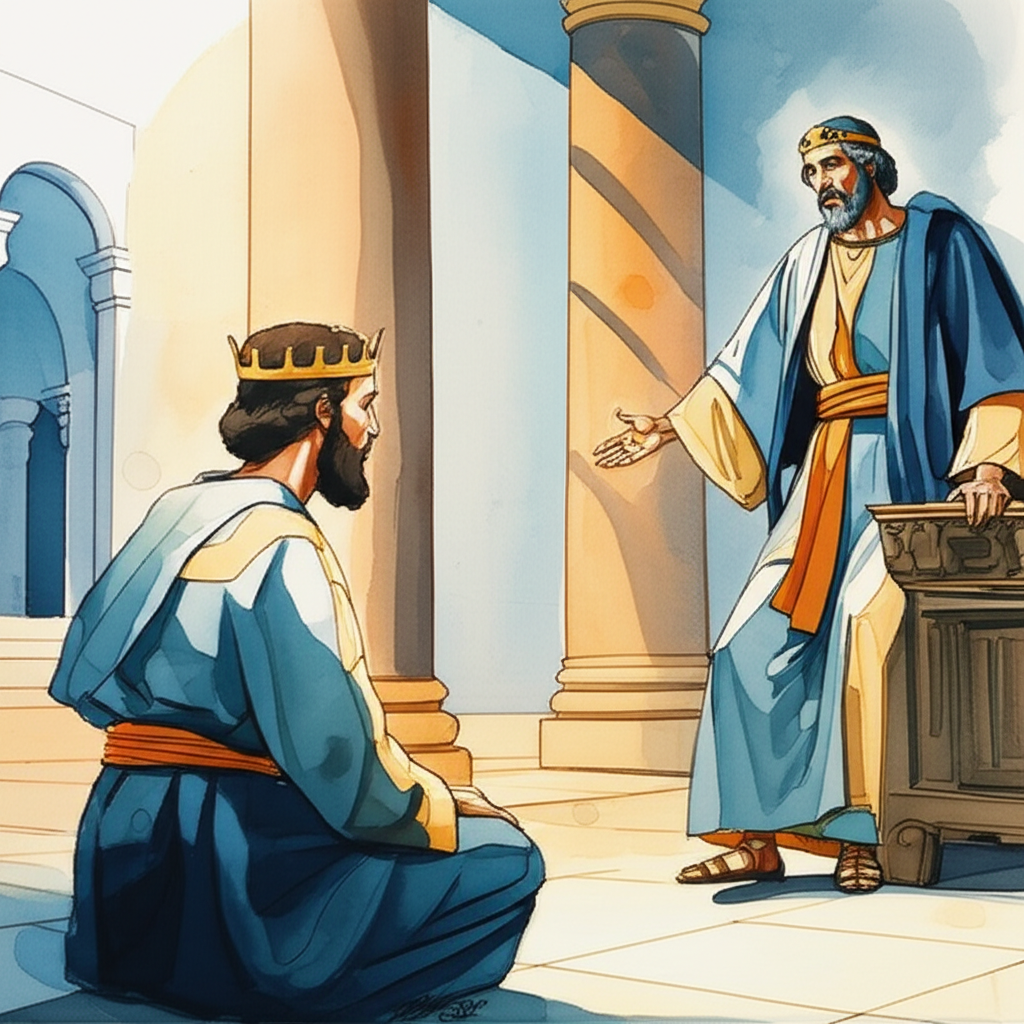
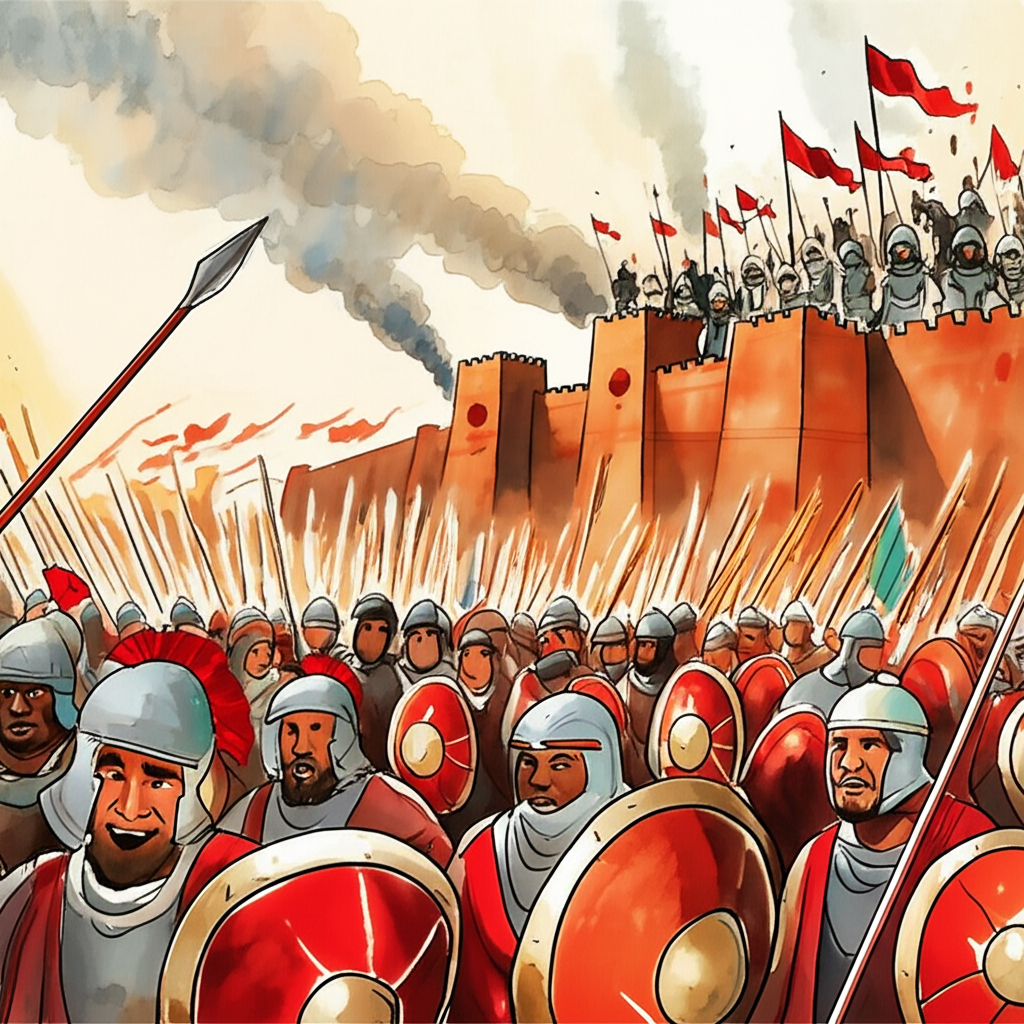
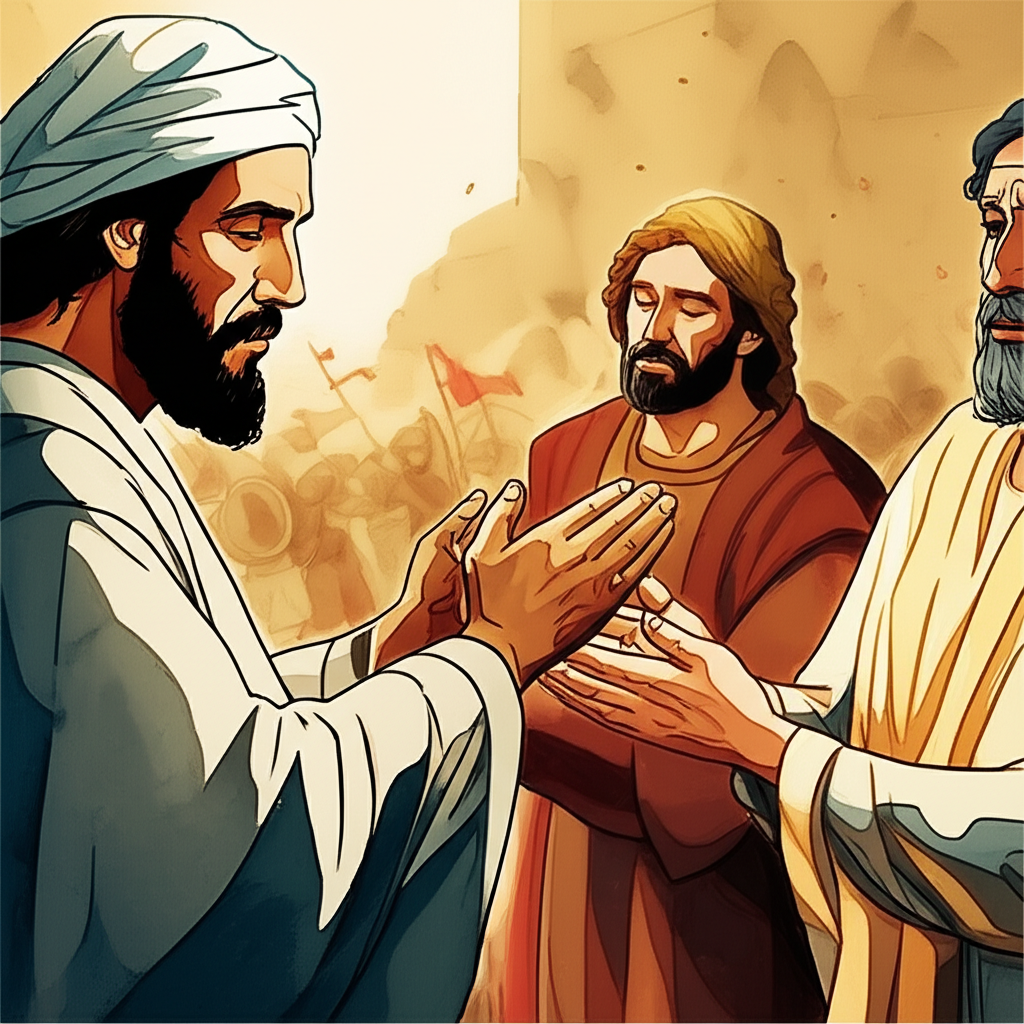
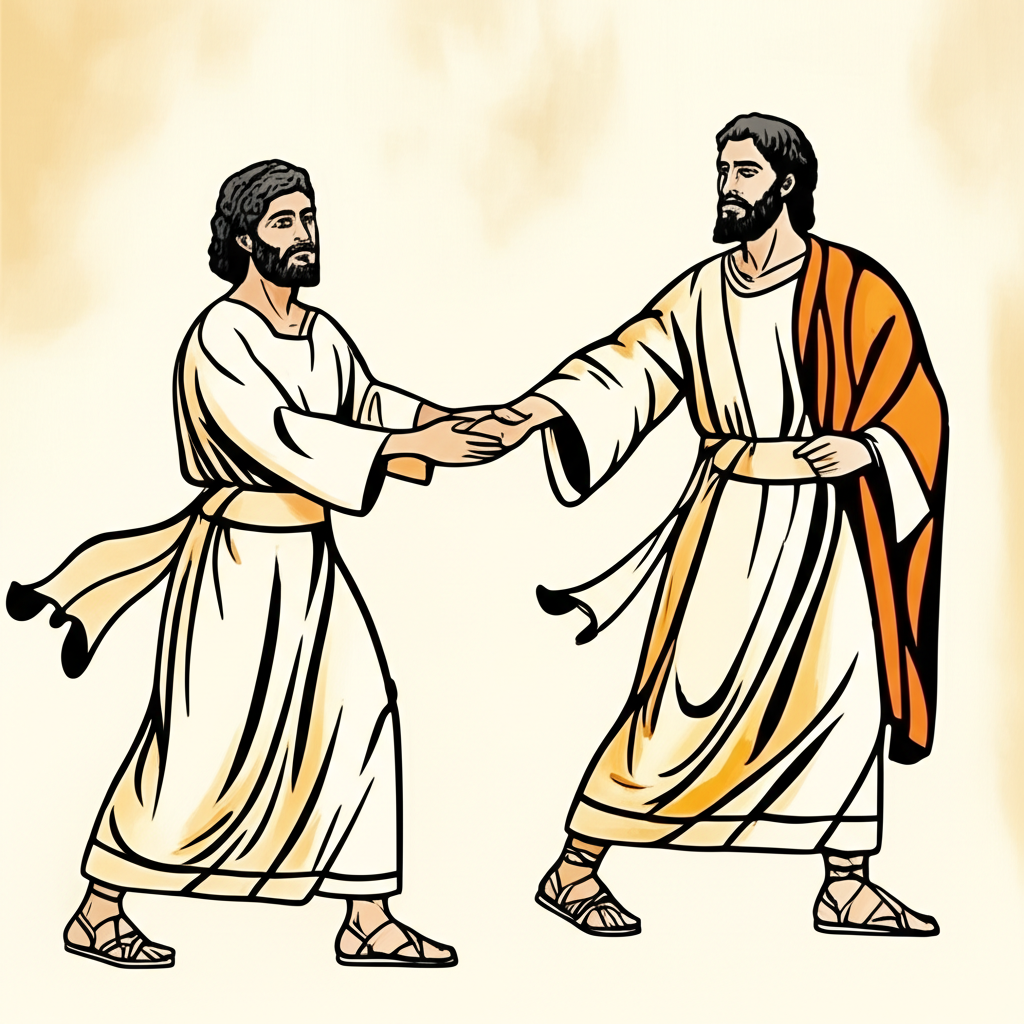
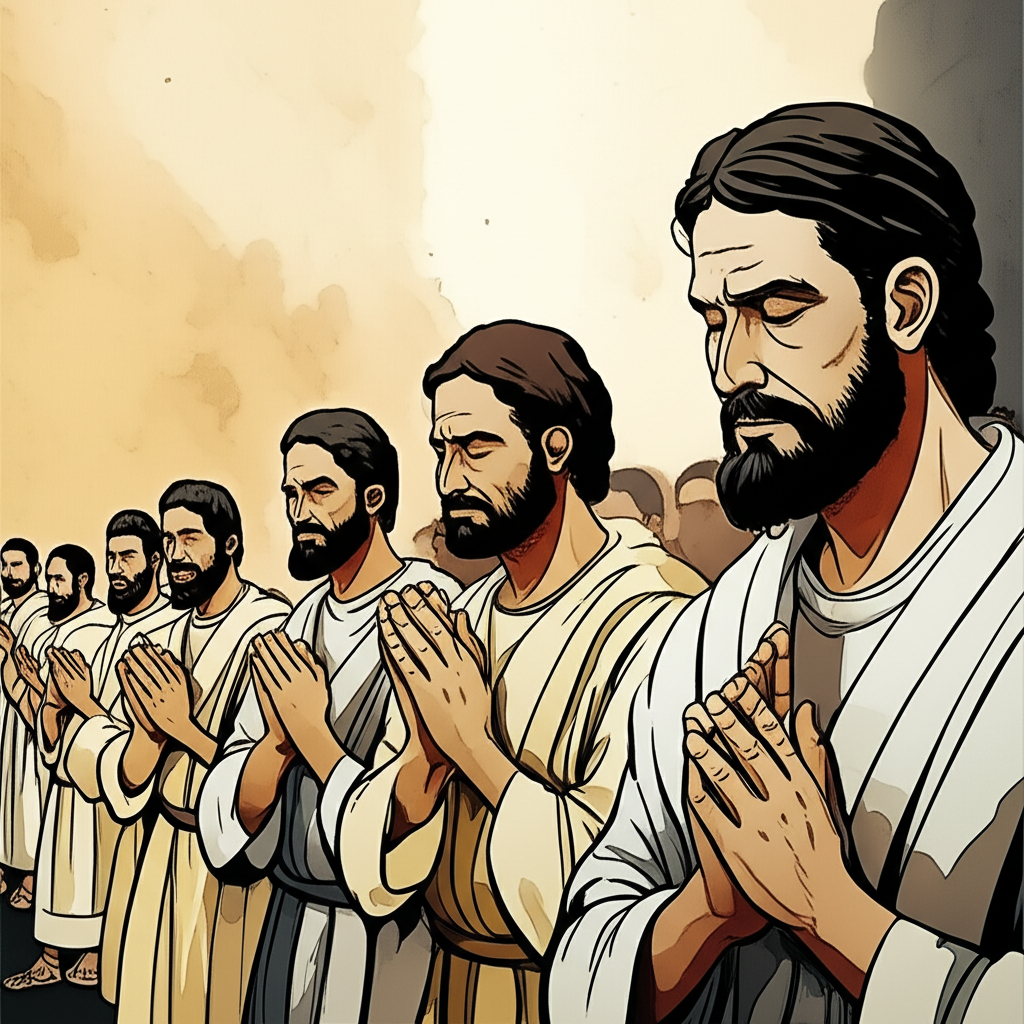

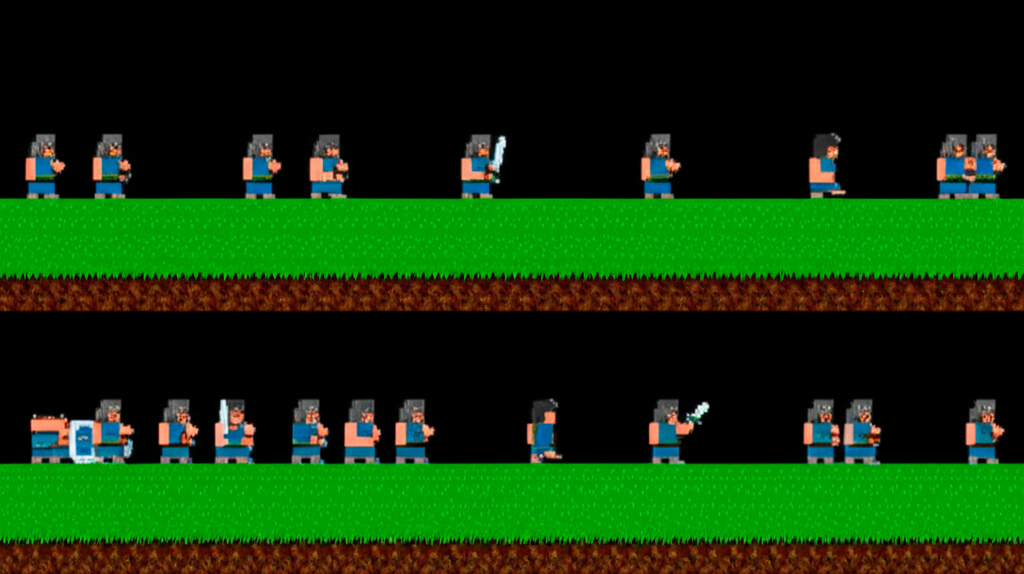
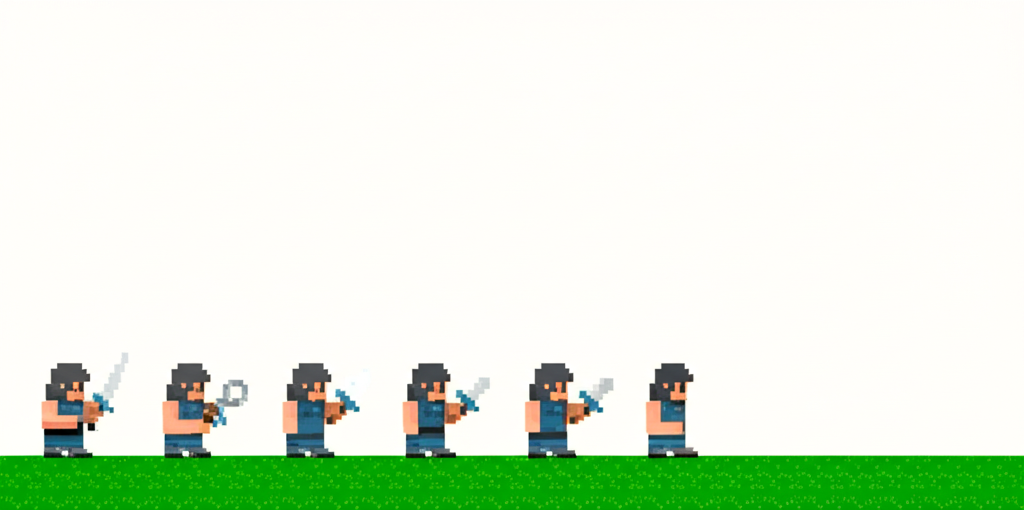
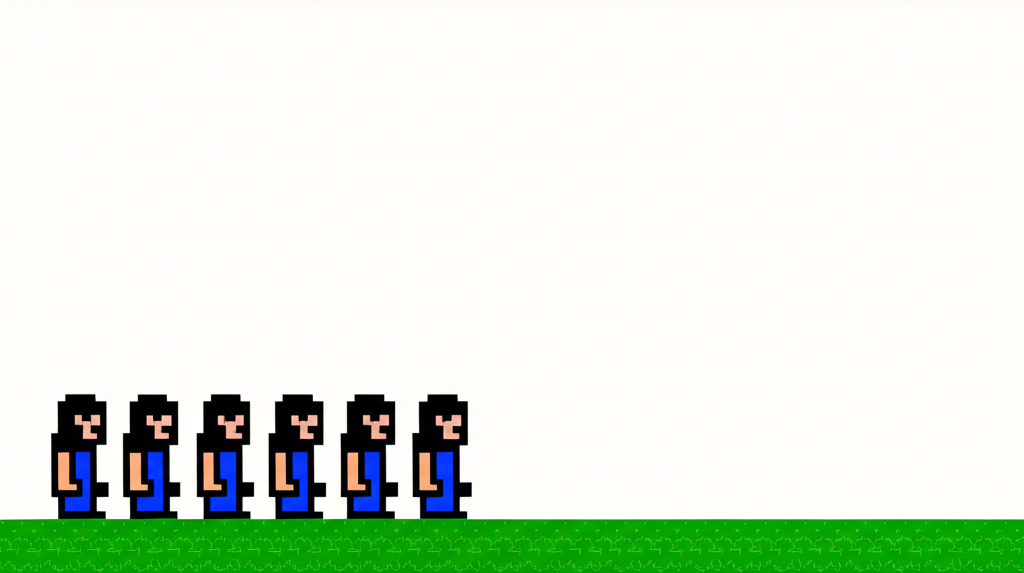
Jeremiah chapter 34 kjv
- 1 The word which came unto Jeremiah from the LORD, when Nebuchadnezzar king of Babylon, and all his army, and all the kingdoms of the earth of his dominion, and all the people, fought against Jerusalem, and against all the cities thereof, saying,
- 2 Thus saith the LORD, the God of Israel; Go and speak to Zedekiah king of Judah, and tell him, Thus saith the LORD; Behold, I will give this city into the hand of the king of Babylon, and he shall burn it with fire:
- 3 And thou shalt not escape out of his hand, but shalt surely be taken, and delivered into his hand; and thine eyes shall behold the eyes of the king of Babylon, and he shall speak with thee mouth to mouth, and thou shalt go to Babylon.
- 4 Yet hear the word of the LORD, O Zedekiah king of Judah; Thus saith the LORD of thee, Thou shalt not die by the sword:
- 5 But thou shalt die in peace: and with the burnings of thy fathers, the former kings which were before thee, so shall they burn odours for thee; and they will lament thee, saying, Ah lord! for I have pronounced the word, saith the LORD.
- 6 Then Jeremiah the prophet spake all these words unto Zedekiah king of Judah in Jerusalem,
- 7 When the king of Babylon's army fought against Jerusalem, and against all the cities of Judah that were left, against Lachish, and against Azekah: for these defenced cities remained of the cities of Judah.
- 8 This is the word that came unto Jeremiah from the LORD, after that the king Zedekiah had made a covenant with all the people which were at Jerusalem, to proclaim liberty unto them;
- 9 That every man should let his manservant, and every man his maidservant, being an Hebrew or an Hebrewess, go free; that none should serve himself of them, to wit, of a Jew his brother.
- 10 Now when all the princes, and all the people, which had entered into the covenant, heard that every one should let his manservant, and every one his maidservant, go free, that none should serve themselves of them any more, then they obeyed, and let them go.
- 11 But afterward they turned, and caused the servants and the handmaids, whom they had let go free, to return, and brought them into subjection for servants and for handmaids.
- 12 Therefore the word of the LORD came to Jeremiah from the LORD, saying,
- 13 Thus saith the LORD, the God of Israel; I made a covenant with your fathers in the day that I brought them forth out of the land of Egypt, out of the house of bondmen, saying,
- 14 At the end of seven years let ye go every man his brother an Hebrew, which hath been sold unto thee; and when he hath served thee six years, thou shalt let him go free from thee: but your fathers hearkened not unto me, neither inclined their ear.
- 15 And ye were now turned, and had done right in my sight, in proclaiming liberty every man to his neighbour; and ye had made a covenant before me in the house which is called by my name:
- 16 But ye turned and polluted my name, and caused every man his servant, and every man his handmaid, whom he had set at liberty at their pleasure, to return, and brought them into subjection, to be unto you for servants and for handmaids.
- 17 Therefore thus saith the LORD; Ye have not hearkened unto me, in proclaiming liberty, every one to his brother, and every man to his neighbour: behold, I proclaim a liberty for you, saith the LORD, to the sword, to the pestilence, and to the famine; and I will make you to be removed into all the kingdoms of the earth.
- 18 And I will give the men that have transgressed my covenant, which have not performed the words of the covenant which they had made before me, when they cut the calf in twain, and passed between the parts thereof,
- 19 The princes of Judah, and the princes of Jerusalem, the eunuchs, and the priests, and all the people of the land, which passed between the parts of the calf;
- 20 I will even give them into the hand of their enemies, and into the hand of them that seek their life: and their dead bodies shall be for meat unto the fowls of the heaven, and to the beasts of the earth.
- 21 And Zedekiah king of Judah and his princes will I give into the hand of their enemies, and into the hand of them that seek their life, and into the hand of the king of Babylon's army, which are gone up from you.
- 22 Behold, I will command, saith the LORD, and cause them to return to this city; and they shall fight against it, and take it, and burn it with fire: and I will make the cities of Judah a desolation without an inhabitant.
Jeremiah chapter 34 nkjv
- 1 The word which came to Jeremiah from the LORD, when Nebuchadnezzar king of Babylon and all his army, all the kingdoms of the earth under his dominion, and all the people, fought against Jerusalem and all its cities, saying,
- 2 "Thus says the LORD, the God of Israel: 'Go and speak to Zedekiah king of Judah and tell him, "Thus says the LORD: 'Behold, I will give this city into the hand of the king of Babylon, and he shall burn it with fire.
- 3 And you shall not escape from his hand, but shall surely be taken and delivered into his hand; your eyes shall see the eyes of the king of Babylon, he shall speak with you face to face, and you shall go to Babylon.' " '
- 4 Yet hear the word of the LORD, O Zedekiah king of Judah! Thus says the LORD concerning you: 'You shall not die by the sword.
- 5 You shall die in peace; as in the ceremonies of your fathers, the former kings who were before you, so they shall burn incense for you and lament for you, saying, "Alas, lord!" For I have pronounced the word, says the LORD.' "
- 6 Then Jeremiah the prophet spoke all these words to Zedekiah king of Judah in Jerusalem,
- 7 when the king of Babylon's army fought against Jerusalem and all the cities of Judah that were left, against Lachish and Azekah; for only these fortified cities remained of the cities of Judah.
- 8 This is the word that came to Jeremiah from the LORD, after King Zedekiah had made a covenant with all the people who were at Jerusalem to proclaim liberty to them:
- 9 that every man should set free his male and female slave?a Hebrew man or woman? that no one should keep a Jewish brother in bondage.
- 10 Now when all the princes and all the people, who had entered into the covenant, heard that everyone should set free his male and female slaves, that no one should keep them in bondage anymore, they obeyed and let them go.
- 11 But afterward they changed their minds and made the male and female slaves return, whom they had set free, and brought them into subjection as male and female slaves.
- 12 Therefore the word of the LORD came to Jeremiah from the LORD, saying,
- 13 "Thus says the LORD, the God of Israel: 'I made a covenant with your fathers in the day that I brought them out of the land of Egypt, out of the house of bondage, saying,
- 14 "At the end of seven years let every man set free his Hebrew brother, who has been sold to him; and when he has served you six years, you shall let him go free from you." But your fathers did not obey Me nor incline their ear.
- 15 Then you recently turned and did what was right in My sight?every man proclaiming liberty to his neighbor; and you made a covenant before Me in the house which is called by My name.
- 16 Then you turned around and profaned My name, and every one of you brought back his male and female slaves, whom you had set at liberty, at their pleasure, and brought them back into subjection, to be your male and female slaves.'
- 17 "Therefore thus says the LORD: 'You have not obeyed Me in proclaiming liberty, every one to his brother and every one to his neighbor. Behold, I proclaim liberty to you,' says the LORD? 'to the sword, to pestilence, and to famine! And I will deliver you to trouble among all the kingdoms of the earth.
- 18 And I will give the men who have transgressed My covenant, who have not performed the words of the covenant which they made before Me, when they cut the calf in two and passed between the parts of it?
- 19 the princes of Judah, the princes of Jerusalem, the eunuchs, the priests, and all the people of the land who passed between the parts of the calf?
- 20 I will give them into the hand of their enemies and into the hand of those who seek their life. Their dead bodies shall be for meat for the birds of the heaven and the beasts of the earth.
- 21 And I will give Zedekiah king of Judah and his princes into the hand of their enemies, into the hand of those who seek their life, and into the hand of the king of Babylon's army which has gone back from you.
- 22 Behold, I will command,' says the LORD, 'and cause them to return to this city. They will fight against it and take it and burn it with fire; and I will make the cities of Judah a desolation without inhabitant.' "
Jeremiah chapter 34 niv
- 1 While Nebuchadnezzar king of Babylon and all his army and all the kingdoms and peoples in the empire he ruled were fighting against Jerusalem and all its surrounding towns, this word came to Jeremiah from the LORD:
- 2 "This is what the LORD, the God of Israel, says: Go to Zedekiah king of Judah and tell him, 'This is what the LORD says: I am about to give this city into the hands of the king of Babylon, and he will burn it down.
- 3 You will not escape from his grasp but will surely be captured and given into his hands. You will see the king of Babylon with your own eyes, and he will speak with you face to face. And you will go to Babylon.
- 4 "?'Yet hear the LORD's promise to you, Zedekiah king of Judah. This is what the LORD says concerning you: You will not die by the sword;
- 5 you will die peacefully. As people made a funeral fire in honor of your predecessors, the kings who ruled before you, so they will make a fire in your honor and lament, "Alas, master!" I myself make this promise, declares the LORD.'?"
- 6 Then Jeremiah the prophet told all this to Zedekiah king of Judah, in Jerusalem,
- 7 while the army of the king of Babylon was fighting against Jerusalem and the other cities of Judah that were still holding out?Lachish and Azekah. These were the only fortified cities left in Judah.
- 8 The word came to Jeremiah from the LORD after King Zedekiah had made a covenant with all the people in Jerusalem to proclaim freedom for the slaves.
- 9 Everyone was to free their Hebrew slaves, both male and female; no one was to hold a fellow Hebrew in bondage.
- 10 So all the officials and people who entered into this covenant agreed that they would free their male and female slaves and no longer hold them in bondage. They agreed, and set them free.
- 11 But afterward they changed their minds and took back the slaves they had freed and enslaved them again.
- 12 Then the word of the LORD came to Jeremiah:
- 13 "This is what the LORD, the God of Israel, says: I made a covenant with your ancestors when I brought them out of Egypt, out of the land of slavery. I said,
- 14 'Every seventh year each of you must free any fellow Hebrews who have sold themselves to you. After they have served you six years, you must let them go free.' Your ancestors, however, did not listen to me or pay attention to me.
- 15 Recently you repented and did what is right in my sight: Each of you proclaimed freedom to your own people. You even made a covenant before me in the house that bears my Name.
- 16 But now you have turned around and profaned my name; each of you has taken back the male and female slaves you had set free to go where they wished. You have forced them to become your slaves again.
- 17 "Therefore this is what the LORD says: You have not obeyed me; you have not proclaimed freedom to your own people. So I now proclaim 'freedom' for you, declares the LORD?'freedom' to fall by the sword, plague and famine. I will make you abhorrent to all the kingdoms of the earth.
- 18 Those who have violated my covenant and have not fulfilled the terms of the covenant they made before me, I will treat like the calf they cut in two and then walked between its pieces.
- 19 The leaders of Judah and Jerusalem, the court officials, the priests and all the people of the land who walked between the pieces of the calf,
- 20 I will deliver into the hands of their enemies who want to kill them. Their dead bodies will become food for the birds and the wild animals.
- 21 "I will deliver Zedekiah king of Judah and his officials into the hands of their enemies who want to kill them, to the army of the king of Babylon, which has withdrawn from you.
- 22 I am going to give the order, declares the LORD, and I will bring them back to this city. They will fight against it, take it and burn it down. And I will lay waste the towns of Judah so no one can live there."
Jeremiah chapter 34 esv
- 1 The word that came to Jeremiah from the LORD, when Nebuchadnezzar king of Babylon and all his army and all the kingdoms of the earth under his dominion and all the peoples were fighting against Jerusalem and all of its cities:
- 2 "Thus says the LORD, the God of Israel: Go and speak to Zedekiah king of Judah and say to him, 'Thus says the LORD: Behold, I am giving this city into the hand of the king of Babylon, and he shall burn it with fire.
- 3 You shall not escape from his hand but shall surely be captured and delivered into his hand. You shall see the king of Babylon eye to eye and speak with him face to face. And you shall go to Babylon.'
- 4 Yet hear the word of the LORD, O Zedekiah king of Judah! Thus says the LORD concerning you: 'You shall not die by the sword.
- 5 You shall die in peace. And as spices were burned for your fathers, the former kings who were before you, so people shall burn spices for you and lament for you, saying, "Alas, lord!"' For I have spoken the word, declares the LORD."
- 6 Then Jeremiah the prophet spoke all these words to Zedekiah king of Judah, in Jerusalem,
- 7 when the army of the king of Babylon was fighting against Jerusalem and against all the cities of Judah that were left, Lachish and Azekah, for these were the only fortified cities of Judah that remained.
- 8 The word that came to Jeremiah from the LORD, after King Zedekiah had made a covenant with all the people in Jerusalem to make a proclamation of liberty to them,
- 9 that everyone should set free his Hebrew slaves, male and female, so that no one should enslave a Jew, his brother.
- 10 And they obeyed, all the officials and all the people who had entered into the covenant that everyone would set free his slave, male or female, so that they would not be enslaved again. They obeyed and set them free.
- 11 But afterward they turned around and took back the male and female slaves they had set free, and brought them into subjection as slaves.
- 12 The word of the LORD came to Jeremiah from the LORD:
- 13 "Thus says the LORD, the God of Israel: I myself made a covenant with your fathers when I brought them out of the land of Egypt, out of the house of slavery, saying,
- 14 'At the end of seven years each of you must set free the fellow Hebrew who has been sold to you and has served you six years; you must set him free from your service.' But your fathers did not listen to me or incline their ears to me.
- 15 You recently repented and did what was right in my eyes by proclaiming liberty, each to his neighbor, and you made a covenant before me in the house that is called by my name,
- 16 but then you turned around and profaned my name when each of you took back his male and female slaves, whom you had set free according to their desire, and you brought them into subjection to be your slaves.
- 17 "Therefore, thus says the LORD: You have not obeyed me by proclaiming liberty, every one to his brother and to his neighbor; behold, I proclaim to you liberty to the sword, to pestilence, and to famine, declares the LORD. I will make you a horror to all the kingdoms of the earth.
- 18 And the men who transgressed my covenant and did not keep the terms of the covenant that they made before me, I will make them like the calf that they cut in two and passed between its parts ?
- 19 the officials of Judah, the officials of Jerusalem, the eunuchs, the priests, and all the people of the land who passed between the parts of the calf.
- 20 And I will give them into the hand of their enemies and into the hand of those who seek their lives. Their dead bodies shall be food for the birds of the air and the beasts of the earth.
- 21 And Zedekiah king of Judah and his officials I will give into the hand of their enemies and into the hand of those who seek their lives, into the hand of the army of the king of Babylon which has withdrawn from you.
- 22 Behold, I will command, declares the LORD, and will bring them back to this city. And they will fight against it and take it and burn it with fire. I will make the cities of Judah a desolation without inhabitant."
Jeremiah chapter 34 nlt
- 1 King Nebuchadnezzar of Babylon came with all the armies from the kingdoms he ruled, and he fought against Jerusalem and the towns of Judah. At that time this message came to Jeremiah from the LORD:
- 2 "Go to King Zedekiah of Judah, and tell him, 'This is what the LORD, the God of Israel, says: I am about to hand this city over to the king of Babylon, and he will burn it down.
- 3 You will not escape his grasp but will be captured and taken to meet the king of Babylon face to face. Then you will be exiled to Babylon.
- 4 "'But listen to this promise from the LORD, O Zedekiah, king of Judah. This is what the LORD says: You will not be killed in war
- 5 but will die peacefully. People will burn incense in your memory, just as they did for your ancestors, the kings who preceded you. They will mourn for you, crying, "Alas, our master is dead!" This I have decreed, says the LORD.'"
- 6 So Jeremiah the prophet delivered the message to King Zedekiah of Judah.
- 7 At this time the Babylonian army was besieging Jerusalem, Lachish, and Azekah ? the only fortified cities of Judah not yet captured.
- 8 This message came to Jeremiah from the LORD after King Zedekiah made a covenant with the people, proclaiming freedom for the slaves.
- 9 He had ordered all the people to free their Hebrew slaves ? both men and women. No one was to keep a fellow Judean in bondage.
- 10 The officials and all the people had obeyed the king's command,
- 11 but later they changed their minds. They took back the men and women they had freed, forcing them to be slaves again.
- 12 So the LORD gave them this message through Jeremiah:
- 13 "This is what the LORD, the God of Israel, says: I made a covenant with your ancestors long ago when I rescued them from their slavery in Egypt.
- 14 I told them that every Hebrew slave must be freed after serving six years. But your ancestors paid no attention to me.
- 15 Recently you repented and did what was right, following my command. You freed your slaves and made a solemn covenant with me in the Temple that bears my name.
- 16 But now you have shrugged off your oath and defiled my name by taking back the men and women you had freed, forcing them to be slaves once again.
- 17 "Therefore, this is what the LORD says: Since you have not obeyed me by setting your countrymen free, I will set you free to be destroyed by war, disease, and famine. You will be an object of horror to all the nations of the earth.
- 18 Because you have broken the terms of our covenant, I will cut you apart just as you cut apart the calf when you walked between its halves to solemnize your vows.
- 19 Yes, I will cut you apart, whether you are officials of Judah or Jerusalem, court officials, priests, or common people ? for you have broken your oath.
- 20 I will give you to your enemies, and they will kill you. Your bodies will be food for the vultures and wild animals.
- 21 "I will hand over King Zedekiah of Judah and his officials to the army of the king of Babylon. And although they have left Jerusalem for a while,
- 22 I will call the Babylonian armies back again. They will fight against this city and will capture it and burn it down. I will see to it that all the towns of Judah are destroyed, with no one living there."
- Bible Book of Jeremiah
- 1 The Call of Jeremiah
- 2 Israel Forsakes the Lord
- 3 Faithless Israel Called to Repentance
- 4 Disaster from the North
- 5 Jerusalem Refused to Repent
- 6 Impending Disaster for Jerusalem
- 7 Evil in the Land
- 8 Sin and Treachery
- 9 Oh that my head were waters, and my eyes a fountain of tears, that I might weep
- 10 Idols and the Living God
- 11 The Broken Covenant
- 12 Jeremiah's Complaint
- 13 The Ruined Loincloth
- 14 Famine, Sword, and Pestilence
- 15 The Lord Will Not Relent
- 16 Famine, Sword, and Death
- 17 The Sin of Judah
- 18 The Potter and Clay
- 19 The Broken Flask
- 20 Jeremiah Persecuted by Pashhur
- 21 Jerusalem Will Fall to Nebuchadnezzar
- 22 Message to the evil Kings
- 23 The Righteous Branch
- 24 The Good Figs and the Bad Figs
- 25 Seventy Years of Captivity
- 26 Jeremiah Threatened with Death
- 27 The Yoke of Nebuchadnezzar
- 28 Hananiah the False Prophet
- 29 Jeremiah's Letter to the Exiles
- 30 Restoration for Israel and Judah
- 31 The Lord Will Turn Mourning to Joy
- 32 Jeremiah Buys a Field During the Siege
- 33 The Lord Promises Peace
- 34 Zedekiah to Die in Babylon
- 35 The Faithful Rechabites
- 36 Jehoiakim Burns Jeremiah's Scroll
- 37 King Zedekiah's vain hope
- 38 Jeremiah Cast into the Cistern
- 39 The Fall of Jerusalem
- 40 Jeremiah Remains in Judah
- 41 Gedaliah Murdered
- 42 Warning Against Going to Egypt
- 43 Jeremiah Taken to Egypt
- 44 Judgment for Idolatry
- 45 Message to Baruch
- 46 Judgment on Egypt
- 47 Judgment on the Philistines
- 48 Judgment on Moab
- 49 Judgment on Ammon
- 50 Judgment on Babylon
- 51 The Utter Destruction of Babylon
- 52 The Fall of Jerusalem Recounted